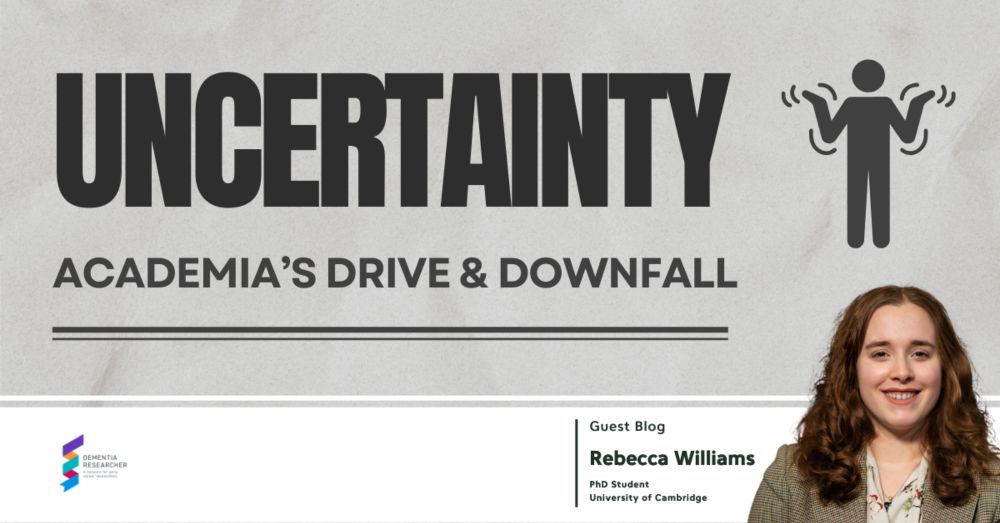

Want to find out how apathy might be more than evaluating cost and benefit? ⚖️ Then read on!
V excited for the release of my first opinion piece on #apathy as a failure of active inference in @cp-trendsneuro.bsky.social with thanks to my co-author @cambridgeftd.bsky.social 😊
If you've ever considered blogging - why not just give it a whirl? You might learn something about yourself 🤔
#academicsky #neuroskyence #scicomm
Rebecca Williams @beccasue99.bsky.social did too.
Three years and 26 blogs later, she discovered something surprising. She had plenty to say, and writing helped her say it better.
www.dementiaresearcher.nihr.ac.uk/blog-why-you...

If you've ever considered blogging - why not just give it a whirl? You might learn something about yourself 🤔
#academicsky #neuroskyence #scicomm
Specifically, are you an ECR that thinks its too early to engage with policy? To thee I say "pfft" - its never too early! Get used to communicating science now and I guarantee it will pay off later 😉
#academicsky #scicomm
www.csap.cam.ac.uk/case-studies...

Specifically, are you an ECR that thinks its too early to engage with policy? To thee I say "pfft" - its never too early! Get used to communicating science now and I guarantee it will pay off later 😉
#academicsky #scicomm
www.csap.cam.ac.uk/case-studies...
www.dementiaresearcher.nihr.ac.uk/collections/...

www.dementiaresearcher.nihr.ac.uk/collections/...
theconversation.com/the-5-stages...

theconversation.com/the-5-stages...
communities.dementiaresearcher.nihr.ac.uk/c/events/res...

communities.dementiaresearcher.nihr.ac.uk/c/events/res...
Want to find out how apathy might be more than evaluating cost and benefit? ⚖️ Then read on!
V excited for the release of my first opinion piece on #apathy as a failure of active inference in @cp-trendsneuro.bsky.social with thanks to my co-author @cambridgeftd.bsky.social 😊

Want to find out how apathy might be more than evaluating cost and benefit? ⚖️ Then read on!
V excited for the release of my first opinion piece on #apathy as a failure of active inference in @cp-trendsneuro.bsky.social with thanks to my co-author @cambridgeftd.bsky.social 😊
Some of my reflections on the final stretch of #PhD life which I hope might be helpful to those coming along next!
#academicsky #WomeninSTEM
pod.fo/e/35d311

Some of my reflections on the final stretch of #PhD life which I hope might be helpful to those coming along next!
#academicsky #WomeninSTEM
After a little break to submit my PhD I'm back to talk about the rocky road to submitting, how I got there and whether a #PhD might even be for you
#neuroskyence #scicomm
youtu.be/lHo2M3kzDeI

After a little break to submit my PhD I'm back to talk about the rocky road to submitting, how I got there and whether a #PhD might even be for you
#neuroskyence #scicomm
youtu.be/lHo2M3kzDeI

Would love to hear others' thoughts on this one 😊
#neuroskyence
@beccasue99.bsky.social explores how gaming could make research more engaging and realistic — from Sea Hero Quest to futuristic lab simulations.
www.dementiaresearcher.nihr.ac.uk/blog-gamifyi...

Would love to hear others' thoughts on this one 😊
#neuroskyence
I'm dressed as the scariest thing of all - a PhD thesis! Proud to say that as of Wednesday mine no longer haunts me haha
Thanks to the whole @cambridgeftd.bsky.social team for their support!
#academicsky #womeninstem #neuroskyence

I'm dressed as the scariest thing of all - a PhD thesis! Proud to say that as of Wednesday mine no longer haunts me haha
Thanks to the whole @cambridgeftd.bsky.social team for their support!
#academicsky #womeninstem #neuroskyence
Our ECSM team's “Polysomnography Pumpkin” brought sleep science to the spooky season - earning second place at Oxford’s Dorothy Crowfoot Hodgkin Building Games!
Brains, electrodes, and a few spiders included.🧠

Our ECSM team's “Polysomnography Pumpkin” brought sleep science to the spooky season - earning second place at Oxford’s Dorothy Crowfoot Hodgkin Building Games!
Brains, electrodes, and a few spiders included.🧠


www.biorxiv.org/cgi/content/...

www.biorxiv.org/cgi/content/...
A slightly different take on the old problem of #apathy - we find evidence that apathy is linked to confidence on action outcomes 🎯
🧠This confidence may be underpinned by self-regulation of prefrontal superficial pyramidal neurons
#neuroskyence
www.biorxiv.org/content/10.1...

A slightly different take on the old problem of #apathy - we find evidence that apathy is linked to confidence on action outcomes 🎯
🧠This confidence may be underpinned by self-regulation of prefrontal superficial pyramidal neurons
#neuroskyence
www.biorxiv.org/content/10.1...
The key takeaway - never hold back from applying to new opportunities. A message I can endorse wholeheartedly.
#academicsky #womeninstem #neuroskyence
sunderlandpsychology.substack.com/p/from-summe...

The key takeaway - never hold back from applying to new opportunities. A message I can endorse wholeheartedly.
#academicsky #womeninstem #neuroskyence
sunderlandpsychology.substack.com/p/from-summe...
pod.fo/e/3396c9

pod.fo/e/3396c9
Join me for my latest blog as I share some reflections on the uncertainty (and maybe thrill??) of careers in the academic sector 🤔
#neuroskyence #WomeninSTEM
www.dementiaresearcher.nihr.ac.uk/blog-uncerta...

Join me for my latest blog as I share some reflections on the uncertainty (and maybe thrill??) of careers in the academic sector 🤔
#neuroskyence #WomeninSTEM
🌟Wondering who’s helping behind the scenes of WiNUK Awards 2025? We’re delighted to share our talented team of judges! 🌟




🌟Wondering who’s helping behind the scenes of WiNUK Awards 2025? We’re delighted to share our talented team of judges! 🌟
As an Oxford alum and current supervisor at Cambridge, safe to say I had some thought 🤣
youtu.be/oVUAZ55_THU

As an Oxford alum and current supervisor at Cambridge, safe to say I had some thought 🤣
youtu.be/oVUAZ55_THU
www.science.org/doi/10.1126/... 🧵 1/n

www.science.org/doi/10.1126/... 🧵 1/n

#neuroskyence #science #scicomm #WomeninSTEM
youtu.be/eJL61d8nm8w

#neuroskyence #science #scicomm #WomeninSTEM
youtu.be/eJL61d8nm8w
youtu.be/b8-jB8TQ9M8

youtu.be/b8-jB8TQ9M8

